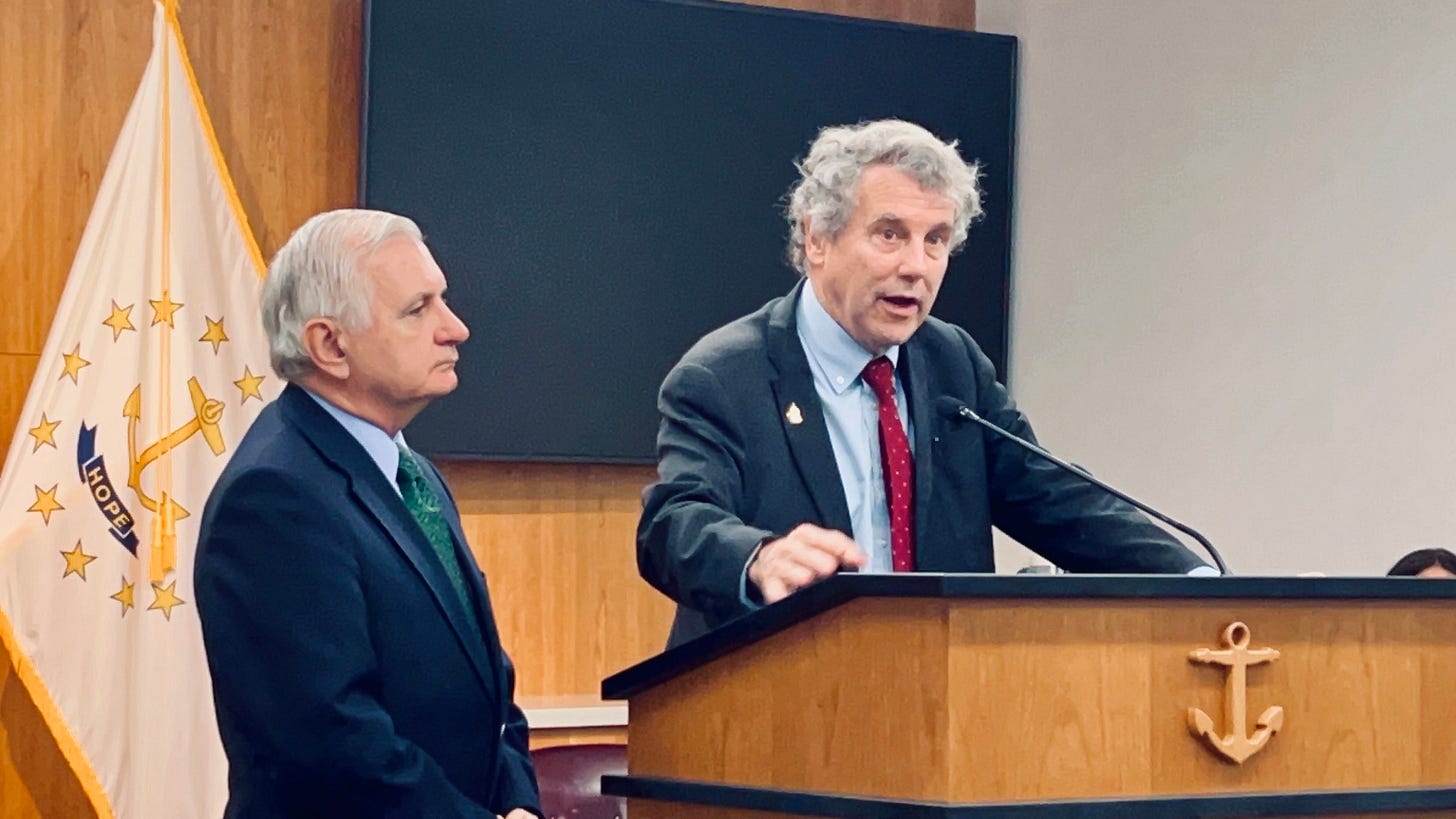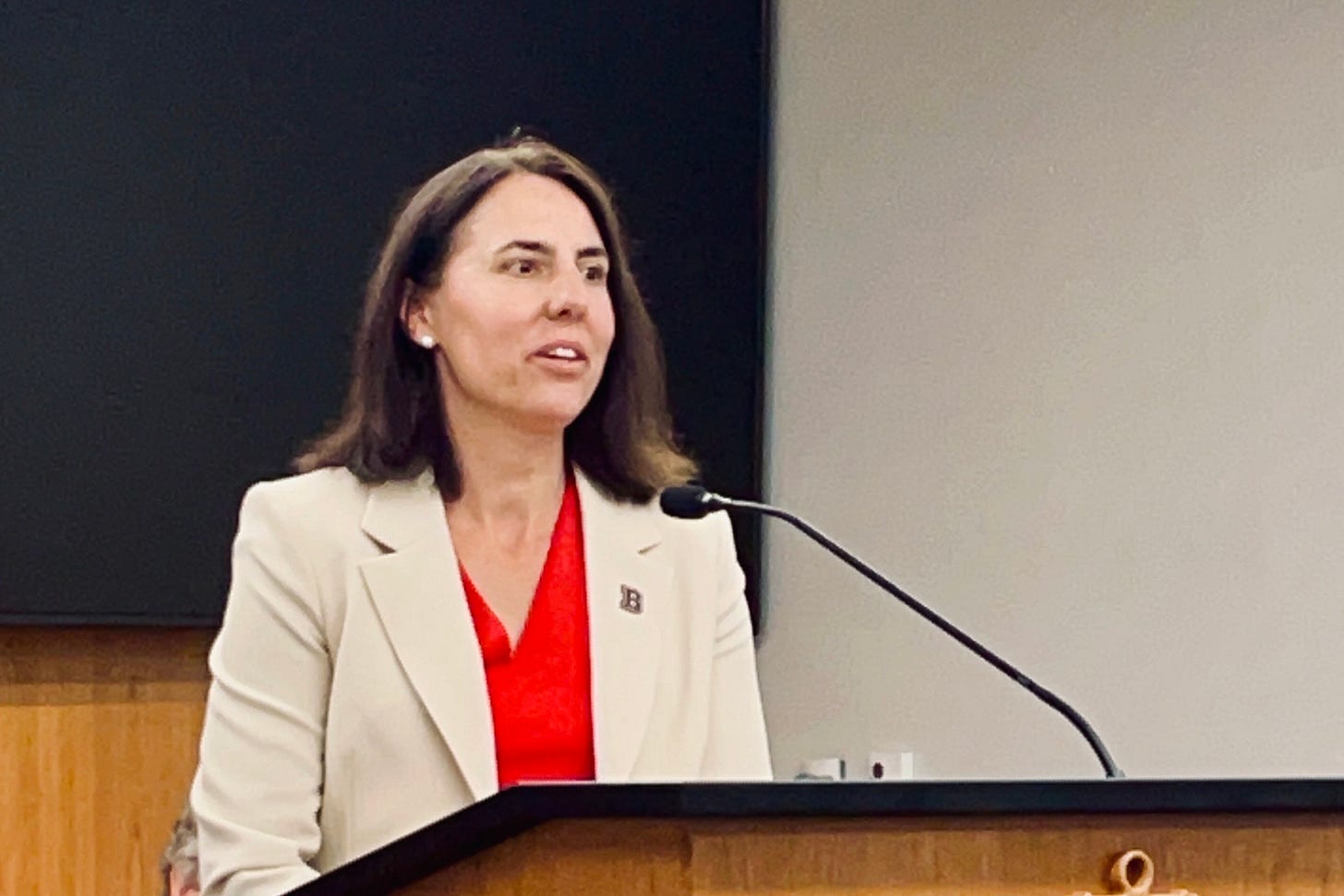Public officials provide update on efforts to combat opioid crisis
"This is not possible without... listening to people directly affected by the opioid epidemic,” said Dr. Francesca Beaudoin, "I can't underscore that last point enough.”
United States Senators Jack Reed (Democrat, Rhode Island) and Sherrod Brown (Democrat, Ohio), were in the Providence offices of Rhode Island Attorney General Peter Neronha Monday morning to discuss ongoing efforts to combat the fentanyl crisis. Specifically, Senators Reed and Brown were there to discuss the bipartisan Fentanyl Eradication and Narcotics Deterrence (FEND) Off Fentanyl Act, which recently passed out of the Senate Committee on Banking, Housing, and Urban Affairs.
The bill, if passed by Congress, targets the illicit fentanyl supply chain, from the chemical suppliers in China to the cartels that traffic the drugs in from Mexico. By strengthening current laws and directing the United States Treasury Department to target, sanction, and block the financial assets of transnational criminal organizations, the FEND Off Fentanyl Act aims to stop the flow of deadly fentanyl into the United States by choking off the income source of those who traffic in synthetic opioids. This supply-side policy aimed at drug cartels will parallel state and federal public health efforts to combat the opioid epidemic.
“We're talking about overdose, death, fentanyl, addiction, et cetera,” said Senator Reed. “It can become a statistic, but we can't forget that there are families who are touched and saddened by these incidents. Our efforts have to be motivated to eliminate those situations At the federal level, Senator Brown led the committee on bi-partisan legislation to crack down on fentanyl traffickers and money launderers. There's an old saying, go after the money, and we are.
“The Fentanyl Act is a sanctions bill and an anti-money laundering bill, and it's aimed at combating the fentanyl crisis by targeting the illicit fentanyl supply chain from the chemical suppliers in China to the cartels that traffic the drugs in from Mexico. If we can disrupt this financing operation, if we can displace it and make sure that this is not a lucrative business, then that's a very powerful tool in defeating the fentanyl crisis all across the world.
“Last year we lost 434 Rhode Islanders to drug overdose and that's roughly the number we lost in 2021. That's 434 more deaths than we need. 75% of those overdoses were related to fentanyl. This is a crisis, but we have seasoned dedicated professional law enforcement officers like the Attorney General and the [Police] Chiefs. We've got brilliant researchers and we have a strong voice in the United States Senate, Senator Brown.”
“We know the toll it's taken. In my state [the crisis] started in rural areas in Southern Appalachia, Ohio, and it spread everywhere,” said Senator Brown. “It's in every community. We know how dangerous the drug is. We know the trafficker is increasingly adding illicit fentanyl, and that the drug is becoming more potent. It's laced, if that's the right word, into other drugs, making them cheaper, more powerful, and more addictive.
“That's why we need the 'all of the above' approach. That's why it's treatment programs, and it's law enforcement. It's the role the federal government can play in trying to keep this stuff out of our country, and out of our community. [The legislation] strengthens current law and directs the Treasury Department to target, sanction, and block the assets of transnational criminal organizations.
“This stuff starts typically as precursor chemicals in China sent to the drugs syndicate, the criminal organizations in Mexico where the drugs are manufactured and sent to the United States. It's all wrapped up with money laundering. It's wrapped up with cryptocurrency. All the ways to avoid law enforcement. We built a large coalition because it wouldn't work without it. We have the support of sheriffs and police officers and leaders in the treatment community. We introduced the bill with 30 Republicans and 30 Democrats. We kept this strictly bipartisan because we knew that to succeed that would be an important element.”
Fentanyl is a highly potent street drug – about 50 times stronger than heroin – and comes in several forms, including liquid and powder. It now dominates the illicit drug market and is increasingly mixed with other illegal drugs. Users can’t tell if the drug they are taking contains fentanyl based on smell, taste, or sight, thus increasing overdose risks.
According to the latest data from the Rhode Island Department of Health (RIDOH), 434 Rhode Islanders died of drug overdoses last year, making it one of the deadliest years on record. Fentanyl was involved in 75 percent of fatal overdose cases in Rhode Island last year, according to RIDOH and PreventOverdoseRI.
The rate of United States drug overdose deaths involving fentanyl more than tripled from 2016 through 2021, according to the United States Centers for Disease Control and Prevention.
“It's no secret that fentanyl is killing people here in Rhode Island and across the country,” said Attorney General Neronha. “I became a prosecutor in Rhode Island in 1995, and it was highly unusual, between 1995 and 2002, to see a heroin case, let alone fentanyl. When we were doing drug trafficking cases, they were always cocaine cases, and rarely did people overdose and die from cocaine. It was during my time as either a U.S. attorney or as an assistant U.S. attorney that heroin, and then later fentanyl, burst onto the scene and changed the dynamic for everyone. Everyone from first responders to U.S. senators, to state leaders, to doctors in emergency rooms, and people who were doing treatment for substance use disorder - the world changed and the magnitude of the problem is extraordinary.
“This office, as most of you know by now because I've certainly talked about it lately, is currently handling 14,000 felony cases with around 60 prosecutors. A good portion of those 14,000 pending felony cases are narcotics trafficking cases. Since I became Attorney General, we have prosecuted, or are in the process of prosecuting, over 500 trafficking cases, many of which, if not most, involve fentanyl.
“But it's not just a prosecution issue, it's a treatment issue as well and we're here to talk about that. Part of the problem for us as state prosecutors is addressing the source of the fentanyl. We have a hard time, like most Rhode Islanders, going over state lines, so the involvement of our federal government is critical. But I also want to mention, in addition to the legislation that the senators will talk more about, the work here in the state to address treatment.
“We have reclassified the simple possession of small amounts of any drug, including fentanyl for personal, use as a misdemeanor because we recognize that that is not felony conduct. It's about cutting off the supply, which the senators will talk about. It's about aggressive prosecution of dealers, which we're doing here in the state, and it's about making sure that everyone who has a substance use disorder problem has access to treatment.
“I'll end with this. I remember when I was a U.S. attorney, I went out to the Adult Correctional Institutions [ACI] for a presentation on the work being done behind the walls on substance use disorder. At the time you had more had a greater likelihood of getting substance use disorder treatment, medical treatment, or medically-assisted substance use disorder treatment in prison than you did on the street. Think about that for a minute. You were more likely to get lifesaving medicine in prison than if you were out of prison.
“That dynamic has changed, because of the good work of Senator Reed, Senator Brown, the congressional delegation, our state leaders, and most importantly, our first responders and our doctors and other healthcare providers that have done such a good job on this topic.”
Researchers from Brown University School of Public Health’s testRI (Toxicological and Ethnographic Drug Surveillance Testing in Rhode Island) test samples from the local drug supply in Rhode Island to inform people who use drugs - and the people who support them - and to strengthen harm reduction messaging and practices. Their data helps identify drug trends, ways to reduce harm from a contaminated drug supply, and areas of research needed.
“As someone who is a public health leader and a physician on the front lines of this epidemic, I can tell you firsthand the toll that Fentanyl has played in the lives of individuals who use drugs, their families, and our communities,” said Dr. Francesca Beaudoin, Chair of the Department of Epidemiology at Brown University. “I look around at what we're doing and the impact is profound, but it's not enough.
“Fentanyl is a manmade synthetic opioid that's 50 times more powerful than heroin. We've said that before, but I feel it's worth repeating all the time because it's not the same stuff that we were dealing with before. When I started practicing in Rhode Island 15 years ago, deaths from fentanyl were uncommon. When
“I worked an ER shift, overdoses were rare. That is no longer the case. Fentanyl is now responsible for the vast majority of overdose deaths. Preventable deaths. In 2021, 80,000 people in the U.S. died of an opioid overdose. That's nearly double just five years earlier. Double. Unfortunately, in Rhode Island, we're following the same trend. As we heard, hundreds of Rhode Islanders lost their lives to opioid overdose. Again, preventable deaths.
“But let me be clear, addiction is a chronic disease and one that can touch any household. The only failure here is if we don't act. This is a public health threat that demands a response from our entire community and it is my sincere hope that with this new legislation, we will disrupt the illicit fentanyl supply chain without criminalizing people living with opioid use disorder here in Rhode Island.
“At the Brown University School of public health, we are leading the way in efforts to reduce the harms of drugs, promote recovery, and improve access to treatment and outcomes, all to save lives. My colleagues have implemented novel drug-checking programs like testRI to learn what is in the drug supply, and to share that information with people who use drugs to reduce the risk of overdose. We've improved access to life-saving medications for opioid use disorder through novel hotlines; 24-hour drop-in centers; and the nation's first-of-its-kind mobile methadone program, bringing treatment to those who are hardest to reach.
“In collaboration with New York University, Brown will study the impacts of the first publicly recognized overdose prevention centers located in New York City and opening next year in Rhode Island. This is not possible without strong community partnerships, collaborations with state agencies, law enforcement, and most importantly, listening to people directly affected by the opioid epidemic. I can't underscore that last point enough.”






